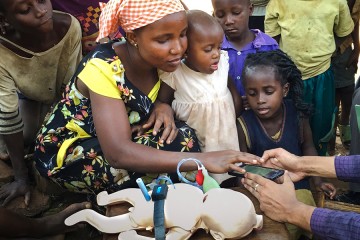The Johns Hopkins Alliance for a Healthier World today announced four recipients of its inaugural Healthier World Challenge Implementation Grants, which provide up to $250,000 over three years to teams to address health inequities among marginalized and vulnerable populations.
The recipients—cross-divisional teams made up of Johns Hopkins University faculty, staff, and students—represent seven of the university's academic divisions.
"Each of the four grants looks at health equity in a very different way with different kinds of teams and different populations, and all of them have a way of linking evidence and using science to making practical differences in peoples lives," said David Peters, director of the Alliance for a Healthier World and chair of the Department of International Health at the Johns Hopkins Bloomberg School of Public Health. "They all have potential for sustainability and scale, and they're all great examples of different entry points for addressing important ways of improving health equity."
The grant recipients are:
Transformative technologies for zero TB in Tibetan kids
Goal: Work with Delek Hospital in India to determine the most effective strategies for eliminating tuberculosis among Tibetan refugee populations, leveraging Johns Hopkins faculty expertise in TB control and treatment, health communications, health economics, and psycho-educational counseling in partnership with local stakeholders to conduct screenings and implement novel drug regimens.
Promoting safe passage from adolescence to adulthood for Native American women
Goal: Adapt mobile apps to provide culturally-congruent, evidence-based information about sexual and reproductive health to adolescent Native American women in Assiniboine Indian Nation, White Clay Nation and White Mountain Apache Nation. Leveraging expertise in app development and over two decades working with First Nations, the team aims to reduce adolescent women's vulnerability to gender-based violence, sexually transmitted diseases, and mental health harm.
Testing a thermal cooker to reduce household air pollution and make cooking with liquid petroleum gas affordable and sustainable in Puno, Peru
Goal: Create a thermal cooker that prevents exposure to hazardous air pollution and allows women in Peru to engage in other family-oriented or livelihood-related activities while cooking. Development will utilize knowledge from anthropology, human-centered design, and qualitative and formative research.
ADHINCRA Study: Addressing Hypertension Care in Africa
Goal: Address gaps in the management of uncontrolled high blood pressure in Ghana by adapting evidence-based approaches to controlling hypertension to the community. The study will provide important data to support future grants for developing scalable interventions to control hypertension in parts of sub-Saharan Africa.
Posted in Health









